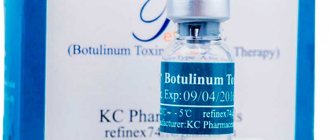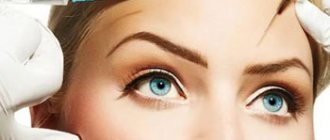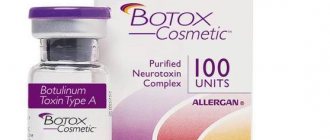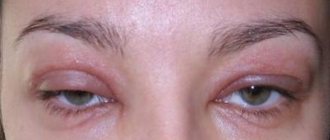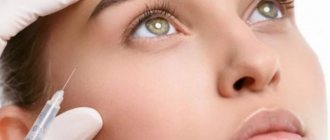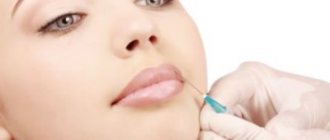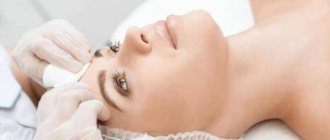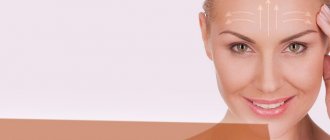Drugs that enhance the paralyzing effect of Botox
When studying the interaction of botulinum toxin with drugs, scientists identified a number of substances that enhance the paralytic effect of Botox:
- substances of the tetracycline group,
- drugs from the polymyxin group,
- drugs from the lincosamide group,
- alkaloid quinidine,
- succinylcholine,
- magnesium sulfate.
The entire list of drugs that enhance the effect of botulinum toxin consists of 370 items. 22 drugs from this list interact particularly actively with Botox.
A patient who decides to undergo Botox injections must notify the doctor about taking any drug from this list. The specialist will either replace one drug with another, or temporarily stop taking it.
Features of the mechanism of action
In order to determine drug compatibility, it is first necessary to take into account the mechanism of action of Botox itself. As mentioned above, the main active ingredient of the drug is weakened botulinum toxin, which causes muscle paralysis at the injection site.
This property is used in cosmetology to relax the facial muscles, which is accompanied by smoothing of the associated epidermal structures. The result of Botox injections is smooth skin, free from facial wrinkles of any severity.
Before carrying out the procedure, please note that Botox rejuvenation is contraindicated in the presence of the following conditions:
- pregnancy and lactation;
- malignant and benign neoplasms of any location;
- exacerbation of chronic diseases;
- infectious-inflammatory process;
- skin diseases;
- bleeding disorders;
- allergy to the components of the drug.
If, at the time of cosmetic manipulation, the patient is indicated to take antibacterial or other medications, it is necessary to study in advance the compatibility of these drugs with Botox.
Botox and tetracycline antibiotics, used in combination, neutralize the rejuvenating effect
Antibiotics prohibited in combination with Botox
- aminoglycosides (gentamicin, neomycin, tobramycin, streptomycin),
- atropine,
- belladonna,
- benztropine,
- darifenacin,
- dicyclomine,
- disopyramide,
- flavoxate,
- glycopyrrolate,
- ipratropium bromide,
- lincomycin,
- muscle relaxants (for example, tubocurarine),
- orphenadrine,
- oxybutynin,
- polymyxins (for example, polymyxin B),
- scopolamine,
- solifenacin,
- spectinomycin,
- tetracyclines,
- tiotropium bromide,
- tolterodine,
- trihexyphenidyl,
- trospium chloride.
Drugs from the aminoglycoside group enhance the effect of botulinum toxin due to their effect on muscle tissue. These medications block muscle activity, the effect of their combination with Botox is unpredictable, so these substances are prohibited.
For a patient who took these medications during treatment for influenza, colds and various acute respiratory viral diseases (ARI, ARVI), injections are given 6 weeks after discontinuation of the medications. After botulinum toxin injections, these drugs are strictly not recommended for use for 12 weeks.
All drugs from the group of muscle relaxants are used during surgical procedures and are aimed at relaxing muscle tissue, which is why they are contraindicated in combination with botulinum toxin, the effect of which is enhanced several times until complete paralysis of the area into which Botox was injected.
What is Dysport
Dysport is a rejuvenating drug based on botulinum toxin.
Its action allows you to relax facial muscles, thereby smoothing out wrinkles. The active component is injected under the skin. Experienced cosmetologists warn that antibiotics and botulinum toxin should not be used at the same time; these substances are incompatible and may react. But doctors do not always explain why they cannot be used together, so many believe that this restriction is unfounded and often violate it. And all this can lead to the development of dangerous health problems and side effects.
Botox is a drug based on botulinum toxin type A. This drug is part of the group of muscle relaxants, which means that it has a relaxing effect on the condition of the muscles and blocks its connection with the nervous system. This remedy is applied to an area of muscle tissue that is paralyzed for a while.
Antibiotics are antibacterial agents that suppress the activity of pathogenic organisms, but sometimes they completely destroy them. They are used in situations where the immune system cannot eliminate the disease on its own.
Some antibacterial drugs have a negative effect on kidney function. Through these organs, botulinum toxin leaves the body. It is believed that this substance stops working when muscle tissue returns to activity - after 4-6 months. But its elimination is observed earlier - approximately 2-3 weeks after injections.
Some types of antibiotics can enhance the effect of toxins that are present in Botox. Even if a specialist can choose the right dose, unpleasant consequences may develop.
But there are antibiotics that can weaken the effect of the neurotoxin. This may negatively affect the result; it may simply not be there even a few weeks after Botox administration. There are no side effects, but the money will be wasted.
Medicines that help reduce the effect of botulinum toxin injections
Botulinum toxin injections in combination with medications that contain B vitamins will not bring the desired result, since the vitamins will not allow wrinkles to smooth out properly.
Psychotropic substances, antidepressants and relaxants can affect muscles, so their use in combination with botulinum toxin is extremely undesirable. Relanium, baclofen and other drugs that can block calcium channels are also strictly prohibited.
All ointments and tablets of the tetracycline group will significantly reduce the effect of botulinum toxin; they should not be consumed a week before injections and for two weeks after.
Dysport injections: Botox or Dysport, indications, contraindications, before and after, prices, reviews
Dysport and Botox
Ignoring medical prohibitions will lead to the fact that you can check the side effects of Dysport from your own experience. Before going to a cosmetologist, determine whether you have any contraindications to taking the drug. They are divided into temporary and permanent.
- It is strictly forbidden for children under 12 years of age to take the drug. The reasons why a child at this age can be prescribed botulinum toxin can be counted on the fingers of one hand. Usually this can be associated with defects in appearance, but since a child’s body is weaker than an adult’s, Dysport is strictly contraindicated for children under 12 years of age.
- Poor blood clotting is also a constant reason for patients refusing the drug. The doctor will not undertake the procedure by giving Dysport injections; he will not be able to predict the consequences that the injection will entail.
- Diseases of the respiratory tract, expressed in acute or chronic form. The most common diseases are rhinitis, sinusitis, tonsillitis, tonsillitis, etc.
- Neuromuscular diseases. These include those diseases that are characterized by dysfunction of voluntary muscles, loss or decrease in control of movements. In most cases, this is myasthenia gravis, that is, a chronic disease that manifests itself in rapid pathological muscle fatigue.
Botulinum toxin injections are contraindicated not only when taking the above medications, but also for certain health problems, which include:
- poor blood clotting;
- neoplasms of various etiologies;
- diabetes;
- infectious diseases;
- chronic pathologies;
- autoimmune diseases;
- dermatological diseases.
Despite the high degree of purification of the neurotoxin, it is still a substance that can be rejected by the body. This manifests itself in the form of an allergic reaction: local redness, burning, itching, severe swelling and fever.
During the period of viral respiratory infections, the Botox procedure is contraindicated.
Botulinum toxin injections are strictly contraindicated for pregnant and lactating women, since a certain amount of the drug still enters the blood, which can lead to serious health problems for the baby.
Don't forget about contraindications
Before agreeing to the procedure, you should undergo a full medical examination and make sure there are no health problems.
Botulinum toxin and aspirin, antipsychotics and alcohol infusions
Medicines based on aspirin affect blood parameters, in particular blood clotting.
The combination of aspirin-based drugs with botulinum toxin leads to the appearance of:
- swelling,
- hematomas,
- bruises,
- bleeding.
Three weeks before Botox injections, you must refrain from using antipsychotics - this combination can have an unpredictable effect on the central nervous system and aggravate mental disorders.
The combination of botulinum toxin with any alcohol is extremely undesirable, although on many forums visitors write the opposite. In all forums dedicated to Botox injections, the compatibility of botulinum toxin and alcohol is one of the main questions.
So why shouldn't you drink alcohol after Botox injections? When alcohol enters the bloodstream, it spreads botulism toxin throughout the body, washing it out of the desired areas. In addition, alcohol has an stimulating effect on the nervous system, while Botox has an inhibitory effect, so even doctors find it difficult to predict which of these effects will be stronger and what damage it will cause to the body.
Why can’t you use this medicine before the procedure and after a while?
Antibiotics have no effect on Botox . The chemical composition inhibits the activity of bacteria. Botulinum toxin is not a bacterium, it is a toxic substance. It is injected into the muscle and inhibits the contraction of muscle fibers, which leads to their temporary paralysis. The skin and muscles stop moving, relax, and wrinkles disappear. You will find a detailed description of the effects of Botox in this article.
To achieve the desired result and not cause harm to health, it is important to correctly calculate the dosage of the drug.
The doctor can do this under an important condition: there must be no medications incompatible with the injection in the patient’s blood. Especially antibiotics.
The patient is required to report taking antibiotics.
In order not to attack your nervous system, you should completely avoid drinking alcohol a month before injections and a month after them.
Despite the fact that the compatibility of botulinum toxin with drugs has not been fully studied, and no extensive clinical studies have been conducted on this issue, it is extremely important to inform your doctor about planned Botox injections, and your cosmetologist about the medications you are taking. If the patient is prescribed drug treatment, beauty injections should be postponed until the end of the treatment.
And treatment of various diseases after cosmetic procedures associated with the use of botulinum toxin is possible only after the final effect of the procedures appears and all traces of injections have disappeared. It is impossible to establish an exact period in this matter - it is individual for each patient. You should not sacrifice your health for the sake of youth and beauty.
Other side effects
The occurrence of complications can be caused not only by the simultaneous use of incompatible drugs or overdose. Negative phenomena may occur due to the fault of a specialist who injected into the wrong place. Also, the cause of the development of complications can be the patient himself, who did not comply with the rules of the rehabilitation period.
The first and natural consequence of Botox injections is the appearance of swelling and small bruises. Such phenomena go away on their own within a few days.
Possible allergic reactions
A more serious consequence is the so-called ptosis of the eyelid, in which it droops. This results in the patient being unable to open his eyes for as long as the neurotoxin is in effect. This complication in most cases occurs due to the fault of the doctor, who inaccurately determined the injection site of the drug.
Another serious complication is diplomacy, which is characterized by double vision. It is also associated with inaccurate injection. This effect usually goes away after a couple of months.
Facial asymmetry is another unpleasant side effect from Botox injections, which can appear due to the fault of a specialist who did not correctly calculate the dosage of the drug in different areas.


